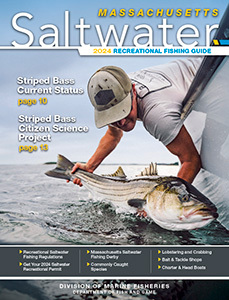Welcome to 2024 Massachusetts Saltwater Fishing

Massachusetts Fisheries Are Great— Help Us Make Them Better

For saltwater anglers, Massachusetts is an amazing place to live, vacation, or visit. We have access to colder-water species of the Gulf of Maine such as haddock and cod and the warmer-water species that visit our shores in the summer and fall, such as black sea bass, scup, bonito, and false albacore. Because of this diversity, Massachusetts likely has the best fishing opportunities in all the Northeast.
Fish populations and fishing opportunities are constantly changing, and temperatures seem to be a big driver. Our winters aren’t as cold as they used to be and it’s rare when our harbors ice in. Our average summer temperatures are getting warmer, driving increases in fish that have been more common in the mid-Atlantic states. Even species such as scup, black sea bass, and fluke that have always been common in waters south of Cape Cod are now seen with regularity north of the Cape. DMF biologists increasingly get inquiries from anglers about fish they are catching but had not seen before. In our southern waters this list includes northern kingfish and lizardfish- and let’s not forget the story of the tarpon caught from shore in Mashpee last summer that had everyone talking.
DMF’s biologists work diligently with their interstate and federal partners to assess the status of fish stocks and fine tune our management approaches to ensure you as anglers have access to these fish and the sport of saltwater fishing. Across many species, the hottest topic in management is now release mortality: taking care of the fish you release to ensure its survival. Our team has done some amazing research on cusk, haddock, and cod to identify the factors that might contribute to helping those fish survive. Our focus has now shifted to striped bass, an iconic sportfish that is prized by anglers throughout Massachusetts and the east coast.
After being at a high population level for decades, striped bass have recently taken a turn for the worse, with five consecutive years of poor spawning success in the Chesapeake Bay. Despite the poor spawning, fishing for larger bass in Massachusetts remains good; so good that scientists estimate that more adult striped bass are currently killed by catch-and release fishing than are harvested and taken home. In response to this emerging issue, DMF started a large-scale research project. Enlisting the help of citizen scientists, our team of dedicated biologists is zeroing in on what anglers can do to improve post-release survival of stripers, including using fewer treble hooks on lures and limiting handling time, especially during the warmer months. With striped bass in danger of a collapse, the onus is on all of us as recreational anglers to take care of these fish. Stripers need our help and conservation will be critical to the well-being of the population and the fishery that it supports. Inside this guide you will find more information about DMF’s efforts and research. Please take the time to learn what we are doing and consider participating as a citizen scientist.
To all our anglers, we wish you calm seas, tight lines, and great days on the water with friends and family. Cheers!

